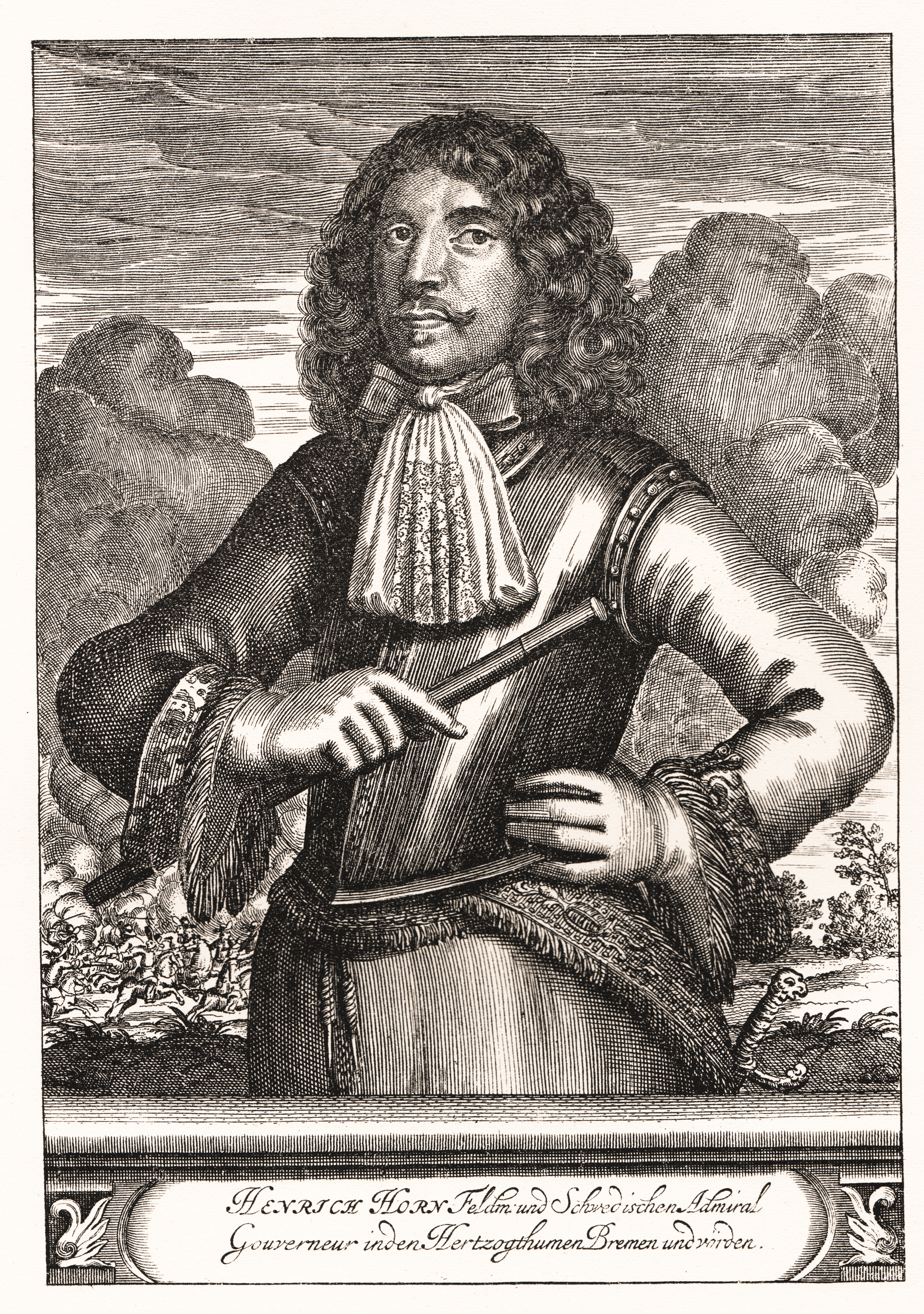Henrik Horn on:
[Wikipedia]
[Google]
[Amazon]
 Henrik Horn (''Henrik Horn af Marienborg'') (22 May 1618 – 22 February 1693) was a Swedish Nobleman (''
Henrik Horn (''Henrik Horn af Marienborg'') (22 May 1618 – 22 February 1693) was a Swedish Nobleman (''
 Henrik Horn (''Henrik Horn af Marienborg'') (22 May 1618 – 22 February 1693) was a Swedish Nobleman (''
Henrik Horn (''Henrik Horn af Marienborg'') (22 May 1618 – 22 February 1693) was a Swedish Nobleman (''friherre
(; male, abbreviated as ), (; his wife, abbreviated as , literally "free lord" or "free lady") and (, his unmarried daughters and maiden aunts) are designations used as titles of nobility in the German-speaking areas of the Holy Roman Empire ...
''), Admiral and member of the Privy Council of Sweden
The Council of the Realm, or simply The Council ( sv, Riksrådet or sv, Rådet: sometimes in la, Senatus Regni Sueciae), was a cabinet of medieval origin, consisting of magnates ( sv, stormän) which advised, and at times co-ruled with, the Ki ...
.
Biography
Henrik Horn was born at Stade in thePrince-Archbishopric of Bremen
The Prince-Archbishopric of Bremen (german: Fürsterzbistum Bremen) — not to be confused with the modern Archdiocese of Hamburg, founded in 1994 — was an ecclesiastical principality (787–1566/1648) of the Holy Roman Empire and the Catholic ...
, today in Lower Saxony
Lower Saxony (german: Niedersachsen ; nds, Neddersassen; stq, Läichsaksen) is a German state (') in northwestern Germany. It is the second-largest state by land area, with , and fourth-largest in population (8 million in 2021) among the 16 ...
, Germany, into a Swedish noble family of medieval origin. He was the son of Henrik Horn (1578-1618) and was born two months after the father's death. During his youth, the city of Stade came under the rule of Sweden possession in 1628. Stade was held by the Danish from 1636 until reverting to Swedish control in 1643. Horn received a military education and pursued a military career in the service of the Royal Swedish Army. At the age of 25, he was appointed Colonel. Horn became Major General in 1654, General Lieutenant and Chief of the Finnish Army in 1657 and Field Marshal in 1665. He distinguished himself in the Polish campaign
The invasion of Poland (1 September – 6 October 1939) was a joint attack on the Republic of Poland by Nazi Germany and the Soviet Union which marked the beginning of World War II. The German invasion began on 1 September 1939, one week afte ...
and in 1666 was appointed Governor-General of Bremen-Verden
), which is a public-law corporation established in 1865 succeeding the estates of the Prince-Archbishopric of Bremen (established in 1397), now providing the local fire insurance in the shown area and supporting with its surplusses cultural effor ...
which was under a Personal union with Sweden from –1712.
As Governor-General he commanded Swedish forces in 1675/76 against the allied German armies during the Bremen-Verden Campaign, but eventually had to surrender. He was given the command of the Royal Swedish Navy
The Swedish Navy ( sv, Svenska marinen) is the naval branch of the Swedish Armed Forces. It is composed of surface and submarine naval units – the Fleet () – as well as marine units, the Amphibious Corps ().
In Swedish, vessels o ...
in 1677 and was made a member of the Privy Council of Sweden
The Council of the Realm, or simply The Council ( sv, Riksrådet or sv, Rådet: sometimes in la, Senatus Regni Sueciae), was a cabinet of medieval origin, consisting of magnates ( sv, stormän) which advised, and at times co-ruled with, the Ki ...
(''riksråd''). That same year, he was defeated by Denmark in the Battle of Køge Bay during the Scanian War. He was appointed to the head of the College of Amiralities in 1677. In 1678, he was appointed as the Commander-in-Chief of Livonia
Livonia ( liv, Līvõmō, et, Liivimaa, fi, Liivinmaa, German and Scandinavian languages: ', archaic German: ''Liefland'', nl, Lijfland, Latvian and lt, Livonija, pl, Inflanty, archaic English: ''Livland'', ''Liwlandia''; russian: Ли ...
which was a dominion of the Swedish Empire
The Swedish Empire was a European great power that exercised territorial control over much of the Baltic region during the 17th and early 18th centuries ( sv, Stormaktstiden, "the Era of Great Power"). The beginning of the empire is usually ta ...
from 1629 until 1721. In 1680, Horn left Livonia and returned to help rebuild Stade which had been besieged in 1676 during the Swedish-Brandenburg War.
Personal life
Horn married in 1674 with Beata Magdalena Wittenberg. He died during 1693 in Stade.See also
* Horn familyReferences
Other Sources
*''Horn, Henrik'' in ''Nationalencyklopedin
''Nationalencyklopedin'' (; "The National Encyclopedia" in English), abbreviated NE, is a comprehensive contemporary Swedish-language encyclopedia, initiated by a favourable loan from the Government of Sweden of 17 million Swedish kronor in 1 ...
'' (1992).
{{DEFAULTSORT:Horn, Henrik
1618 births
1693 deaths
People from Stade
Swedish nobility
Swedish generals
17th-century Swedish politicians
Swedish admirals
17th-century Swedish military personnel